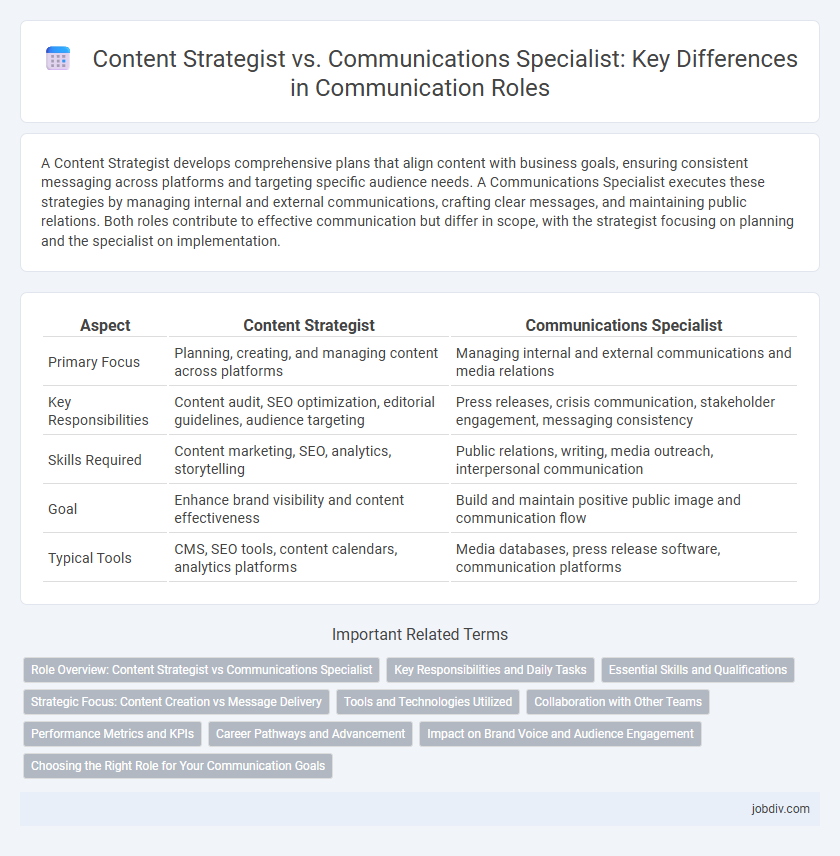A Content Strategist develops comprehensive plans that align content with business goals, ensuring consistent messaging across platforms and targeting specific audience needs. A Communications Specialist executes these strategies by managing internal and external communications, crafting clear messages, and maintaining public relations. Both roles contribute to effective communication but differ in scope, with the strategist focusing on planning and the specialist on implementation.
Table of Comparison
| Aspect | Content Strategist | Communications Specialist |
|---|---|---|
| Primary Focus | Planning, creating, and managing content across platforms | Managing internal and external communications and media relations |
| Key Responsibilities | Content audit, SEO optimization, editorial guidelines, audience targeting | Press releases, crisis communication, stakeholder engagement, messaging consistency |
| Skills Required | Content marketing, SEO, analytics, storytelling | Public relations, writing, media outreach, interpersonal communication |
| Goal | Enhance brand visibility and content effectiveness | Build and maintain positive public image and communication flow |
| Typical Tools | CMS, SEO tools, content calendars, analytics platforms | Media databases, press release software, communication platforms |
Role Overview: Content Strategist vs Communications Specialist
A Content Strategist develops and manages the planning, creation, and delivery of content to align with brand goals and target audiences, leveraging data analytics and SEO techniques to optimize engagement. A Communications Specialist focuses on crafting and disseminating messages through various channels to maintain a positive public image and ensure clear internal and external communication. Both roles require strong writing skills, but a Content Strategist emphasizes content lifecycle management, while a Communications Specialist prioritizes message consistency and stakeholder relations.
Key Responsibilities and Daily Tasks
Content Strategists develop comprehensive content plans by analyzing audience data, setting editorial guidelines, and coordinating content creation to ensure brand consistency. Communications Specialists manage internal and external messaging, handle media relations, draft press releases, and monitor communication effectiveness to maintain a positive public image. While Content Strategists prioritize content lifecycle management and audience engagement strategies, Communications Specialists focus on message delivery and stakeholder communication.
Essential Skills and Qualifications
Content Strategists require expertise in content creation, audience analysis, SEO, and digital marketing to craft targeted, effective messaging across multiple platforms. Communications Specialists focus on media relations, public speaking, crisis management, and internal communications to maintain clear and consistent organizational messaging. Both roles demand strong writing skills, creativity, and proficiency with communication tools, but Content Strategists emphasize strategic content planning, while Communications Specialists excel in message delivery and stakeholder engagement.
Strategic Focus: Content Creation vs Message Delivery
Content Strategists emphasize content creation by developing targeted campaigns, editorial calendars, and audience personas to optimize engagement through varied digital platforms. Communications Specialists prioritize message delivery, ensuring clarity, consistency, and alignment with organizational goals across internal and external channels. Effective communication strategies rely on the synergy between content innovation and precise message dissemination for impactful audience connection.
Tools and Technologies Utilized
A Content Strategist leverages content management systems (CMS) such as WordPress and analytics tools like Google Analytics to plan, create, and optimize digital content for targeted audiences. In contrast, a Communications Specialist frequently utilizes media monitoring software, email marketing platforms like Mailchimp, and social media management tools such as Hootsuite to execute and monitor communication campaigns. Both roles require proficiency in collaboration tools like Slack and project management software including Trello or Asana to streamline workflows and ensure cross-functional alignment.
Collaboration with Other Teams
Content Strategists collaborate closely with marketing, design, and product teams to develop cohesive content plans that align with brand goals and user needs. Communications Specialists work with public relations, customer service, and executive teams to ensure consistent messaging and manage internal and external communications effectively. Both roles require strong teamwork skills to synchronize efforts and amplify organizational objectives through integrated communication strategies.
Performance Metrics and KPIs
Content strategists prioritize metrics such as content engagement rates, organic traffic growth, and conversion rates to optimize campaign effectiveness. Communications specialists focus on KPIs like message reach, audience sentiment analysis, and media coverage to measure brand reputation and public relations impact. Both roles use data-driven insights but target distinct performance indicators aligned with their strategic objectives.
Career Pathways and Advancement
Content strategists typically advance by gaining expertise in digital marketing, SEO, and content analytics, often progressing to roles such as Content Director or Chief Content Officer. Communications specialists usually develop skills in media relations, corporate communications, and crisis management, moving toward positions like Communications Manager or Director of Communications. Both career paths offer growth opportunities in leadership, with content strategists emphasizing content creation and optimization, while communications specialists focus on brand messaging and stakeholder engagement.
Impact on Brand Voice and Audience Engagement
A Content Strategist shapes the brand voice by crafting a cohesive narrative across all platforms, ensuring messaging aligns with audience preferences and market trends. A Communications Specialist focuses on delivering targeted messages that enhance audience engagement through timely and relevant interactions, often managing public relations and media outreach. Both roles drive brand consistency but differ in scope; strategists mold long-term voice strategy while communicators execute immediate audience engagement tactics.
Choosing the Right Role for Your Communication Goals
A Content Strategist focuses on creating and managing content plans that align with brand messaging and audience engagement, leveraging analytics to optimize content performance across digital channels. A Communications Specialist excels in crafting targeted messages and managing public relations to enhance organizational reputation and stakeholder relationships. Choosing the right role depends on whether your communication goals prioritize strategic content development or comprehensive communication management and external media relations.
Content Strategist vs Communications Specialist Infographic

 jobdiv.com
jobdiv.com